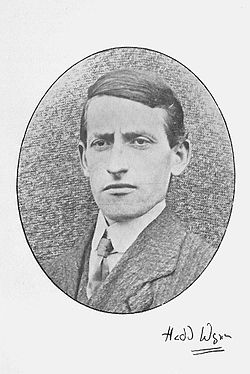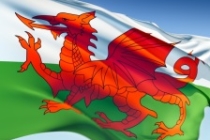Hedd Wyn and "The Eisteddfod of the Black Chair"
Ellis Humphrey Evans was born at Yr Ysgwrn, the family farm in Trawsfynydd, in 1887. Better known by his bardic name Hedd Wyn (Welsh for Blessed Peace) he composed his first poem by the age of eleven. He worked with his father on the family hill farm from the age of 14 and wrote much of his poetry when working there as a shepherd. His talent for poetry became increasingly known and he took part in competitions and local eisteddfodau. He won his first chair (Cadair y Bardd) in Bala, at the age of 20 in 1907. He was given the bardic name Hedd Wyn in 1910, He went on to win chairs at the local eisteddfodau at Pwllheli, Llanuwchllyn, and Pontardawe. In 1915 he wrote his first poem for the National Eisteddfod of Wales—Eryri, an ode to Snowdon. The following year he took second place at the Aberystwyth National Eisteddfod with Ystrad Fflur, an awdl written in honour of Strata Florida, the medieval Cistercian abbey ruins in Ceredigion.
Nedd Wyn also wrote several war poems following the outbreak of the first world war in 1914. He was a Christian pacifist and at first did not enlist for the war, believing he could never kill anyone. The conflict inspired a number of his poems including, Rhyfel ("War"):
Gwae fi fy myw mewn oes mor ddreng,
A Duw ar drai ar orwel pell;
O'i ôl mae dyn, yn deyrn a gwreng,
Yn codi ei awdurdod hell.
Pan deimlodd fyned ymaith Dduw
Cyfododd gledd i ladd ei frawd;
Mae sŵn yr ymladd ar ein clyw,
A'i gysgod ar fythynnod tlawd.
Mae'r hen delynau genid gynt,
Ynghrog ar gangau'r helyg draw,
A gwaedd y bechgyn lond y gwynt,
A'u gwaed yn gymysg efo'r glaw
Why must I live in this grim age,
When, to a far horizon, God
Has ebbed away, and man, with rage,
Now wields the sceptre and the rod?
Man raised his sword, once God had gone,
To slay his brother, and the roar
Of battlefields now casts upon
Our homes the shadow of the war.
The harps to which we sang are hung,
On willow boughs, and their refrain
Drowned by the anguish of the young
Whose blood is mingled with the rain.
Although resistant to enlisting, by 1916 the family were told that they had to send one of their sons to join the British Army. Hedd Wyn enlisted rather than having to see his younger brother Robert sent to war. Like 280,000 other Welshmen he was conscripted to fight in the first world war. In 1916 he went to join the Royal Welch Fusiliers and was sent to the front in June 1917. On July 31,1917 in Flanders at Pilkem Ridge, near Ypres in Belgium he was hit by a shell and mortally wounded.
Only weeks later, on 6 September 1917, at the 1917 National Eisteddfod Chairing of the Bard ceremony the winning poem was named as Yr Arwr (The Hero), written under the nom-de-plume Fleur-de-Lis. But no one stepped forward to accept the honour and it was discovered that Fleur-de-Lis was none other than Hedd Wyn. Evan Rees, known by the bardic name Dyfed, Archdruid of the National Eisteddfod of Wales announced that the festival be now referred to as "Eisteddfod y Gadair Ddu" ("The Eisteddfod of the Black Chair"). The empty chair was draped with a black cloth.







